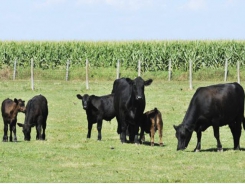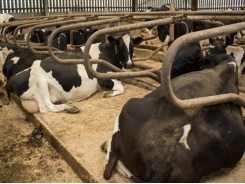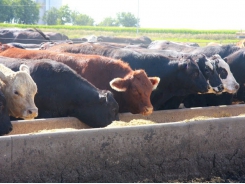New England researchers to evaluate seaweed as methane mitigant

Besides reducing methane emissions from cattle, study could support seaweed aquaculture.
A new $3 million grant will support the efforts of New England scientists to reduce methane emissions from cattle. Bigelow Laboratory for Ocean Sciences in East Boothbay, Maine, has spent the last two years developing tools to evaluate potential algae-based supplements that may have the desired effect, and it will now lead a collaborative effort to test for the most-promising seaweeds from Maine.
"This is some of the most exciting research I’ve been a part of," said Nichole Price, a senior research scientist at the Bigelow Laboratory and the project lead. "It has the potential to curb global methane emissions, and our approach can also directly support the region’s dairy and seaweed farmers."
The new grant from the Shelby Cullom Davis Charitable Fund is the fund’s third investment in this research. It will allow scientists from Bigelow Laboratory to collaborate with researchers from Wolfe's Neck Center for Agriculture & the Environment in Freeport, Maine; Colby College in Waterville, Maine; the University of Vermont, and the University of New Hampshire.
Many seaweeds are rich in nutrients, the Bigelow Laboratory said, noting that feeding them to cattle may have the added benefits of improving the health of the animals and even the quality of the soil where they pasture.
The new project funding will enable the team to search for a seaweed, or blend of seaweeds, that optimizes all these potential benefits.
Price directs the Center for Seafood Solutions at Bigelow Laboratory, which develops science-based solutions for seafood industries. She believes that creating this new feed product could bolster Maine’s seaweed aquaculture industry, remediate ocean conditions, help recycle important nutrients and empower the dairy industry to improve both the health of their animals and the planet, the announcement said.
"Different types of seaweeds have different impacts on the complex microbial environment inside a cow’s rumen," said Sabrina Greenwood, an associate professor at the University of Vermont and an expert in animal nutrition. "The approach taken by this project provides an incredible opportunity to really push ahead with identification and refinement of natural nutritional supplements that could be great for both the cow and the environment."
The team will launch a two-year initiative in December, capitalizing on the tools developed by Bigelow Laboratory senior research scientists Steve Archer and Dave Emerson. Ben Twining, a senior research scientist and the Henry L. & Grace Doherty vice president for education, will contribute his expertise in trace metals to the project and coordinate education initiatives with Colby College that allow students to learn from this research, the announcement said.
In their first round of experiments, the team will screen seaweeds for important compounds that make them good candidates for a feed additive. Next, they will conduct laboratory testing at the University of Vermont to determine if the most promising seaweeds effectively reduce methane production. They plan to conduct feeding trials with grazing herds at the Wolfe's Neck Center and the University of New Hampshire in the summer of 2020 and 2021.
"We are thrilled to be part of this highly collaborative and actionable research," said Dorn Cox, research director at the Wolfe's Neck Center. "It is so important to build bridges between our working landscape and waterfront, and this project can help to share knowledge that will contribute to climate adaptation and mitigation."
Earlier this year, Penn State researchers reported on the results of a trial that supplementing cattle feed with one type of seaweed could result in a significant reduction in methane belched by livestock, but they cautioned that the practice may not be a realistic strategy to battle climate change due to the amount of seaweed required.
Related news
Tools

Phối trộn thức ăn chăn nuôi

Pha dung dịch thủy canh

Định mức cho tôm ăn

Phối trộn phân bón NPK

Xác định tỷ lệ tôm sống

Chuyển đổi đơn vị phân bón

Xác định công suất sục khí

Chuyển đổi đơn vị tôm

Tính diện tích nhà kính

Tính thể tích ao




 International partners to study endocannabinoid system in dairy…
International partners to study endocannabinoid system in dairy…  New feeding model explored for US cattle feedlots
New feeding model explored for US cattle feedlots